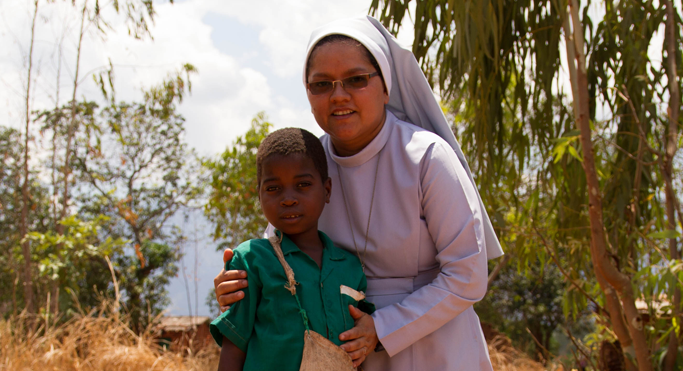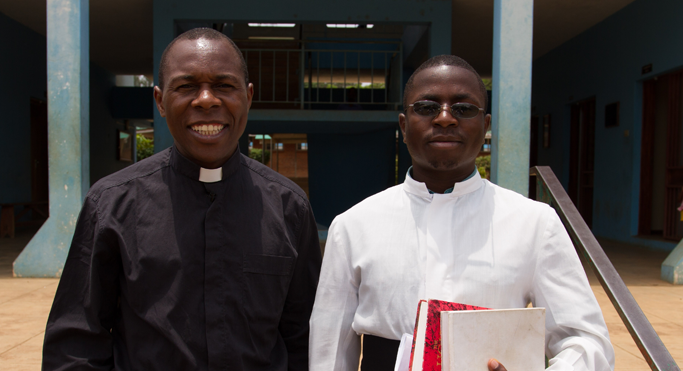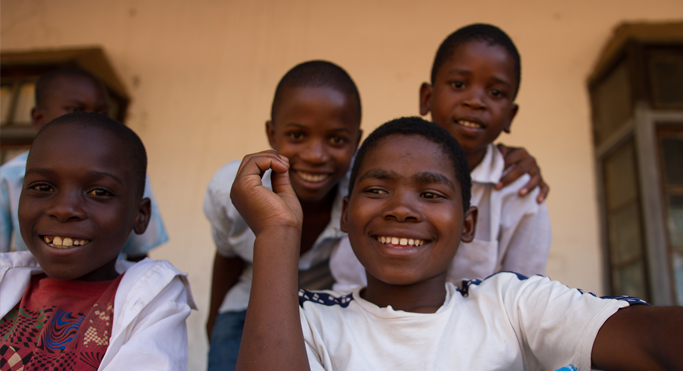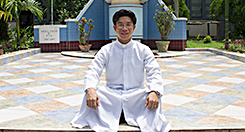A member of the Missio team visited Sri Lanka last year and has a whole new appreciation for tea…
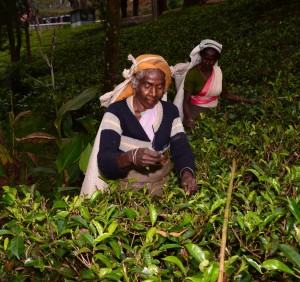 Winding our way through the twists and turns of the Sri Lankan hill country at tremendous heights left me with a feeling of awe. The lush plantations on either side of the road reminded me of TV advertisements for tea I’d seen as a child – layers of never-ending green leaves. Amongst the greenery were tiny, brightly coloured dots, which on closer inspection became tea plantation workers. Literally hundreds of people were nimbly picking leaves on those steep green hills.
Winding our way through the twists and turns of the Sri Lankan hill country at tremendous heights left me with a feeling of awe. The lush plantations on either side of the road reminded me of TV advertisements for tea I’d seen as a child – layers of never-ending green leaves. Amongst the greenery were tiny, brightly coloured dots, which on closer inspection became tea plantation workers. Literally hundreds of people were nimbly picking leaves on those steep green hills.
A steep trek
We arrived at the tea estate in Badulla. There we had to leave our vehicle and trek on foot up the mountainside. It was too steep for the van. As I stepped through the mud, I was conscious of how easy it would be to tumble down the incline. But with a reassuring arm or hand within my grasp, I eventually made it past ramshackle houses to a clearing. Chickens strutted around the yard and curious youngsters looked out from their doorways.
We were there with Fr Benedict Eugene OMI, a missionary priest who has worked amongst the tea plantation workers for five years. Our aim was to meet families living in these remote areas. When I asked about his work, he said:
‘I am working for the poor, less fortunate and the marginalised in my attempt to continue Jesus’ mission of uplifting the downtrodden.’
Before we arrived, he’d explained that the area we were travelling to was terribly remote. And many people in the small community were living in dire poverty.
Please help Missio support young and poor parishes like Badulla.
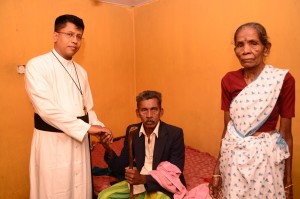 Kuppen Rasu’s story
Kuppen Rasu’s story
Kuppen Rasu sat on the edge of his mattress in his tiny bedroom at the back of a small concrete house. He tried to stand as we entered, but winced with pain and quickly sat back down. Fr Benedict told us that Kuppen Rasu is 74 years old. He has worked on the tea estate, picking tea, for over thirty years. But now he can’t walk. He had been housebound for the last ten years.
Kuppen Rasu explained he is suffering from a blood disorder, but could not explain his condition or why it only affected his legs. He was unable to access medical treatment because his home is high on the hill, on almost impassable terrain. He couldn’t afford to live elsewhere; was unable to afford to travel to a hospital in a three-wheeler or tuk-tuk; couldn’t travel the distance because his pain was unbearable. And even if he could make the journey, he would not be able to pay for medical assistance when he arrived.
No help any more
Kuppen Rasu’s wife, Thangamma, stood quietly as her husband of forty-seven years told their life story. They had both picked tea for the estate and as a condition of their employment, they were given free board and free medical checks. But now they were retired and not earning any income, they were not entitled to any benefits any more. With tears rolling down his cheeks and in evident physical pain, Kuppen Rasu shared that they couldn’t afford to eat. They relied entirely on the generosity of their neighbours, Fr Eugene and the Lunugala parish. As he spoke, his wife also began to silently weep with the hopelessness of their circumstances. As Fr Eugene says:
‘The people living on the estate are under estate management and have to depend on the estate management for everything. However, it is not enough to satisfy even their basic needs. The government authorities think and presume that the estate management is looking after these people… Government hospitals are far away and pregnant women, children and the elderly face many problems; unnecessary deaths are very common and normal in the plantation sector.’
Sadly, Kuppen Rasu’s plight is all too common in the tea and rubber plantations of Sri Lanka. Once unable to work, these elderly people are forgotten; relegated to living in despair and misery.
A helping hand
Fr Eugene gently rested his hand on Kuppen Rasu’s shoulder and spoke to him softly in Tamil. Although I was unable to understand his words, I watched as Kuppen Rasu sighed deeply while reaching for Fr Eugene’s hand.
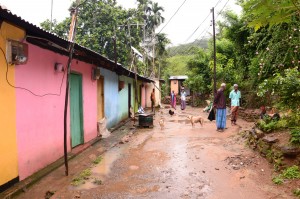
But with Missio’s help, they are planning construction of a new diocesan hospital. Free medical care will be offered to the elderly and orphaned, and affordable health care will be provided to all in the Badulla diocese, irrespective of ethnicity or religious belief.
Please offer a helping hand to people like Kuppen Rasu, by donating to Missio
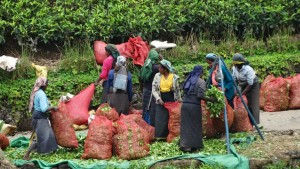 The poorest province
The poorest province
This diocese is the poorest province in Sri Lanka, and many people have to choose to spend their meagre earnings on food over healthcare. In this area, the most common issues are eye conditions, caused by the dust from the tea plants. Also far too common are cases of malnourishment, and heart and respiratory conditions, associated with the chemicals sprayed on the tea plants.
The new hospital will allow for more easily accessible, more affordable health care for the entire community. Fr Eugene explained:
‘Serving the parish of Lunugala is very special as our service is needed not only by the small Catholic communities in the tea estates, but by all of the other people of different religions too. There are so many people affected by various illnesses that need to be supported.’
This article is from Mission Today – Spring 2017, which is one of our quarterly magazines for supporters of the Red Box – you can download the entire magazine below or read more here.
Attachments
| File |
|---|
| Mission Today - Spring 2017 |


